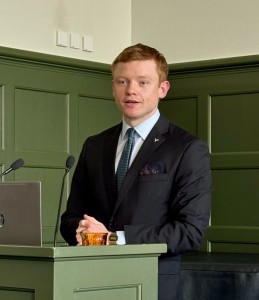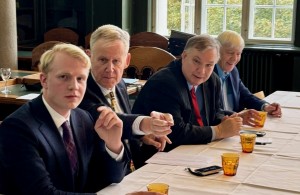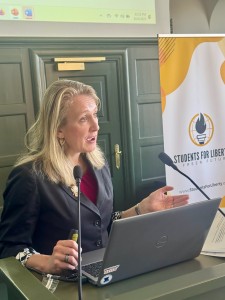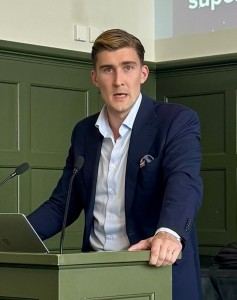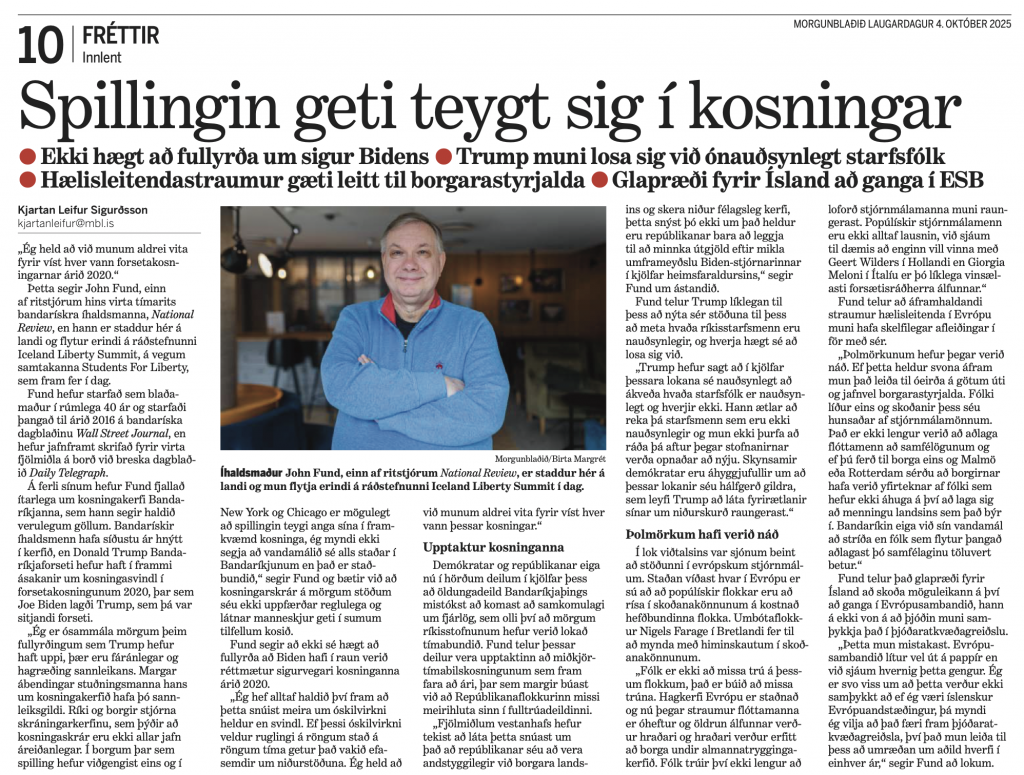The meeting hall of the Icelandic House of Museums (Safnahusid) was packed on Saturday 4 October when Students for Liberty Europe and RSE, the Icelandic Research Centre for Social and Economic Affairs, jointly held a conference on ‘The European Union: Friend or Foe of Liberty?’ Breki Atlason, the Icelandic coordinator of Students for Liberty, chaired the meeting, while Professor Emeritus Hannes H. Gissurarson, on behalf of RSE, introduced the speakers and directed the questions and answers period. Júlíus Viggó Ólafsson, economics students at the University of Iceland and the leader of Young Independents, gave a short opening address. He said that young people were increasingly rejecting the Left, both in Iceland and elsewhere, but that even if some of them turned to national conservatism, it was important that they did not reject economic freedom, the engine of progress. Dr. Eamonn Butler, former Director of the Adam Smith Institute in London and the author of several books on classical liberal themes, spoke first in the former session. He is an old friend of Iceland, being one of the few who publicly protested against the use of an anti-terrorism law against Iceland during the 2008 Icelandic bank collapse. Butler said that Brexit, the exit of Great Britain from the European Union, was for him and other Brexiteers about regaining control of their own country, instead of seeing it transferred it to a non-transparent, undemocratic, non-accountable bureaucracy in Brussels. Brexit was, he submitted, a success in that indeed Great Britain had regained her sovereignty, but what he and other Brexiteers had underestimated was the sheer malevolence of the Brussels bureaucrats who had tried to make the process as difficult and cumbersome as possible.
When introducing John Fund, Editor of National Review and commentator on Fox News, Professor Gissurarson quoted the old Chinese curse: May you live in interesting times. Indeed, the Americans now lived in interesting times, he said. Fund spoke about the rise of populism in North America and Europe. It signified a widespread feeling, he said, that the ruling elites on those two continents were ignoring the interests and ideas of ordinary people, not least the worry that left-wing extremists and religious zealots from afar were imposing their views on others. Fund added that the Icelanders were facing a historic decision about the European Union: whether or not to transfer control from Reykjavik to Brussels. If they decided to defy the elites, it would be noted all over the world. Fund was interviewed by Morgunbladid on 4 October and by RUV, the government broadcasting station, on 6 October where he mainly discussed American politics.
Ragnar Árnason, Professor Emeritus of Economics at the University of Iceland, pointed out what he regarded as obvious: You only decide to join an association if you think that it will benefit you in some way. In his estimate, the costs for Iceland of joining the European Union were much greater than the benefits. Iceland was one of the most prosperous European countries, like two other non-members, Norway and Switzerland, and therefore she would be a net contributor to the European Union. She had great natural resources, undoubtedly coveted in Brussels. Moreover, Iceland did not have to join the EU in order to ensure her security: She already had a defence treaty with the United States and she was a member state of NATO, the North Atlantic Treaty Organisation. If Iceland became a member country, she would have no more say on European affairs than other small European countries which had, as everybody could observe, negligible influence. Árnason added that even if it was concluded that the benefits of membership would slightly outweigh the costs, there was an additional invisible cost which was that under the circumstances of uncertainty, the decision was almost irreversible. Therefore, even if the benefits were estimated to outweigh the costs, it would be rational to postpone a decision until it was clear what the future would hold. There was more to lose from the decision to join if it turned out to be wrong than there was to gain from it if it turned out to be sensible.
A lively discussion followed the first session. Dr. Daniel Mitchell of the Freedom and Prosperity Association in Washington DC spoke first in the second session. He pointed out that the gap between living standards in the United States and the European Union had increased in the last few decades. The EU countries had stagnated, and this was, he submitted, because they enjoyed less economic freedom and suffered higher taxes than the United States. He illustrated this with a lot of graphs whose data were all from respected sources such as the World Bank. The EU was a sinking ship, he said. It might have been sensible by the poorer nations of Europe to join the EU to ensure their security and to improve their legal framework, but it made no sense for Iceland. After the conference, Mitchell wrote a blog about it.
When introducing the two last speakers, Siri Terjesen, Professor of Economics at Florida Pacific University, and Gale Pooley, Professor of Economics at Utah Tech University, Professor Gissurarson reminded the audience of another Chinese saying: Lit the candle instead of just cursing the darkness. These two speakers were going to talk about hope, the possibility of a better future for young people despite bureaucrats and demagogues, the conditions for progress, economic growth, improved living standards. Terjesen explained to the audience the great benefits of encouraging entrepreneurship by moderate taxes and an efficient but light regulatory framework. Pooley introduced a new way of thinking about living standards. It was not in terms of money, not even money adjusted to the price level. This was thinking in terms of ‘time price’ which was money price divided by hourly income. Progress was that it was taking lesser and lesser time to earn the money to buy goods. For example, for the time you had to work in 1952 to buy an air conditioning unit, you could in 2024 for the same time get 45. 5 units. For the time you had to work in 1900 to buy one bottle of Coca Cola, you could in 2023 for the same time get 55.2 bottles. Pooley emphasised the creativity of human beings, as he had done in his recent book, coauthored with Marian Tupy, Superabundance.
Snorri Másson, Member of Parliament for the Centre Party, made some brief closing remarks. He said that a massive onslaught on the freedom of speech had taken place in the West in recent years, under the banners of wokeism and cancel culture. It was crucial for young people to resist this onslaught. It should never be forgotten that freedom was also the freedom to express unpopular opinions. After the conference, RSE invited all the participants to a reception on the premises where a lively discussion took place again. In the evening, the foreign speakers and the leadership of Students for Liberty Europe attended a barbecue at Professor Gissurarson’s home, where Einar Arnalds Kristjánsson was in charge of cooking. Lukas Schweiger, a former Chairman of Students for Liberty Europe and an Austrian resident in Iceland, Halla Margrét Hilmarsdóttir, a veteran of Students for Liberty Europe, and Gísli Valdórsson, project manager at RSE, also helped organise the conference and contributed much to its success.


